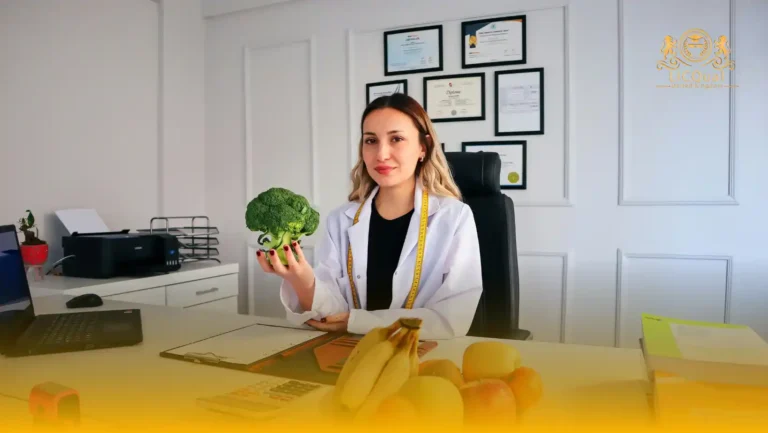The LICQual Level 3 Certificate in Maternal and Child Nutrition (Cert Maternal and Child Nutrition) is a specialised qualification designed for learners who wish to develop advanced knowledge and practical skills in nutrition for mothers, infants, and children. This course is ideal for professionals seeking to enhance their career prospects, broaden their expertise, and maintain high standards in Continuing Professional Development (CPD).
Learners will explore the nutritional requirements throughout preconception, pregnancy, breastfeeding, and early childhood. The programme covers key topics such as maternal dietary needs, infant feeding practices, childhood nutrition, and strategies to prevent and manage diet-related conditions. Learners will gain the ability to apply evidence-based nutritional guidance in clinical, community, and wellness settings.
Centres delivering this qualification are required to uphold the highest standards of training, ensuring learners are supported by competent and qualified staff. Additionally, centres must provide all necessary learning materials, digital resources, and practical tools to enable learners to fully engage with the course content and achieve successful outcomes.
By completing the LICQual Level 3 Certificate in Maternal and Child Nutrition, learners will acquire the knowledge and professional skills needed to support maternal and child health effectively. This qualification provides a strong foundation for those committed to advancing their careers in nutrition, dietetics, healthcare, and public health, allowing them to deliver evidence-based nutritional interventions with confidence and professionalism.
Course Overview
Qualification Title
LICQual Level 3 Certificate in Maternal and Child Nutrition (Cert Maternal and Child Nutrition)
Total Units
6
Total Credits
60
GLH
240
Qualification #
LICQ2201009
Qualification Specification
To enroll in the LICQual Level 3 Certificate in Clinical Nutrigenomics (Cert Nutrigenomics) , applicants must meet the following criteria:
|
Qualification# |
Unit Title |
Credits |
GLH |
|---|---|---|---|
|
LICQ2201009-1 |
Introduction to Maternal and Child Nutrition |
10 |
40 |
|
LICQ2201009-2 |
Maternal Nutritional Requirements |
10 |
40 |
|
LICQ2201009-3 |
Infant Nutrition and Feeding Practices |
10 |
40 |
|
LICQ2201009-4 |
Childhood Nutrition and Growth |
10 |
40 |
|
LICQ2201009-5 |
Special Diets and Nutritional Challenges |
10 |
40 |
|
LICQ2201009-6 |
Research, Communication and Professional Practice |
10 |
40 |
By the end of this course, learners will be able to:
Unit 1: Introduction to Maternal and Child Nutrition
By the end of this unit, learners will be able to:
- Explain the physiological and developmental aspects of nutrition in preconception, pregnancy, lactation, and early childhood.
- Analyse the impact of maternal and child nutrition on health outcomes.
- Identify key concepts in maternal and child nutrition and their relevance to professional practice.
- Apply foundational knowledge to support evidence-based nutritional guidance for mothers and children.
Unit 2: Maternal Nutritional Requirements
By the end of this unit, learners will be able to:
- Identify macro- and micronutrient requirements during preconception, pregnancy, and lactation.
- Evaluate strategies to support maternal health, wellbeing, and optimal fetal development.
- Assess the role of diet in preventing maternal nutrient deficiencies and pregnancy-related conditions.
- Recommend dietary interventions to promote maternal health and successful pregnancy outcomes.
Unit 3: Infant Nutrition and Feeding Practices
By the end of this unit, learners will be able to:
- Explain the nutritional requirements of infants from birth to weaning.
- Analyse breastfeeding, formula feeding, and complementary feeding practices.
- Assess the impact of feeding practices on infant growth and development.
- Provide evidence-based recommendations for optimal infant nutrition and feeding.
Unit 4: Childhood Nutrition and Growth
By the end of this unit, learners will be able to:
- Describe the nutritional needs of children during early childhood.
- Monitor and assess growth and dietary intake to identify nutritional deficiencies.
- Evaluate strategies to prevent malnutrition and diet-related health conditions in children.
- Develop age-appropriate dietary plans to support healthy growth and development.
Unit 5: Special Diets and Nutritional Challenges
By the end of this unit, learners will be able to:
- Identify nutritional considerations for allergies, intolerances, and medical conditions in mothers and children.
- Analyse the challenges associated with special diets and at-risk populations.
- Design tailored dietary interventions to meet individual nutritional needs safely and effectively.
- Apply professional judgement to manage nutritional challenges in clinical or community settings.
Unit 6: Research, Communication and Professional Practice
By the end of this unit, learners will be able to:
- Conduct research using reliable sources and appropriate methods in maternal and child nutrition.
- Analyse and interpret nutritional data to support evidence-based practice.
- Communicate nutritional information effectively through reports, presentations, and consultations.
- Demonstrate critical thinking and professional judgement in applying research findings to maternal and child nutrition practice.
This qualification is designed for learners seeking to specialise in nutrition for mothers, infants, and children. It is ideal for:
- Aspiring Nutrition and Dietetics Professionals – Individuals aiming to develop expertise in maternal and child nutrition and support healthy development.
- Healthcare Practitioners – Nurses, midwives, health visitors, and allied health professionals looking to enhance their knowledge of maternal and child nutritional needs.
- Wellness and Fitness Specialists – Health coaches, personal trainers, and wellness consultants seeking to provide nutrition guidance for mothers and young children.
- Community and Public Health Workers – Professionals involved in maternal and child health programmes, education, and community nutrition initiatives.
- Early Years and Childcare Professionals – Staff working in nurseries, schools, and childcare settings who wish to improve dietary support for children.
- Career Changers – Individuals seeking to enter the field of maternal and child nutrition with a recognised Level 3 qualification.
- CPD-Focused Learners – Professionals committed to Continuing Professional Development (CPD) and staying up-to-date with evidence-based practices in maternal and child nutrition.
By completing this course, learners will gain the scientific knowledge, practical skills, and professional credibility to apply evidence-based nutritional strategies in clinical, community, and wellness settings for mothers and children.
To deliver the LICQual Level 3 Certificate in Maternal and Child Nutrition, centres must meet the following standards to ensure high-quality training and learner success:
- Qualified and Competent Staff – Centres must employ tutors and assessors with recognised qualifications and relevant professional experience in maternal and child nutrition, healthcare, or dietetics to provide expert guidance to learners.
- Comprehensive Learning Resources – Centres should provide learners with access to up-to-date textbooks, scientific journals, digital resources, and practical tools necessary for completing all units of the course.
- Practical Training Facilities – Centres must have access to suitable facilities, including kitchens, laboratories, or demonstration areas, to support practical learning and applied nutrition exercises.
- Assessment and Feedback Systems – Centres must implement robust assessment procedures, including formative and summative evaluations, and provide timely, constructive feedback to support learner progress.
- Health and Safety Compliance – Centres must maintain high standards of health and safety in all learning environments, ensuring that learners can engage safely in practical activities.
- Commitment to Continuing Professional Development (CPD) – Centres should encourage both staff and learners to engage in CPD activities to remain current with developments in maternal and child nutrition.
- Quality Assurance Processes – Centres must have effective monitoring and evaluation systems to ensure consistent course delivery, adherence to LICQual standards, and continuous improvement of teaching and learning.
By meeting these requirements, centres create a professional, supportive, and resource-rich learning environment that enables learners to successfully achieve the LICQual Level 3 Certificate in Maternal and Child Nutrition, enhancing their knowledge, practical skills, and career prospects in maternal and child health and nutrition.
Assessment and Verification
All units within this qualification are subject to internal assessment by the approved centre and external verification by LICQual. The qualification follows a criterion-referenced assessment approach, ensuring that learners meet all specified learning outcomes.
To achieve a ‘Pass’ in any unit, learners must provide valid, sufficient, and authentic evidence demonstrating their attainment of all learning outcomes and compliance with the prescribed assessment criteria. The Assessor is responsible for evaluating the evidence and determining whether the learner has successfully met the required standards.
Assessors must maintain a clear and comprehensive audit trail, documenting the basis for their assessment decisions to ensure transparency, consistency, and compliance with quality assurance requirements.







